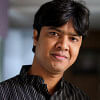
Emran Mahfuz
Poet and litterateur Emran Mahfuz Born on 10th October in Comilla district in Bangladesh, Emran is a son of a veteran freedom fighter Abul Kalam Mohammed Nurul Alam Khan and Bilkish Begum. He is the editor of the literary magazine “Kaler Dhoni” and Star Books-Coordinator in English daily ‘The Daily Star’. He has already published 7 books till 2019.

















